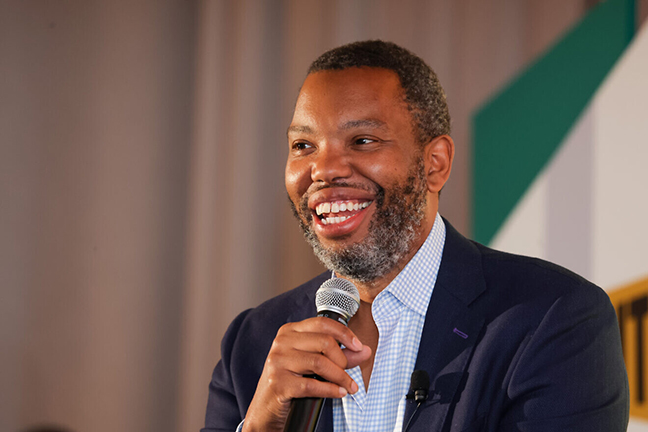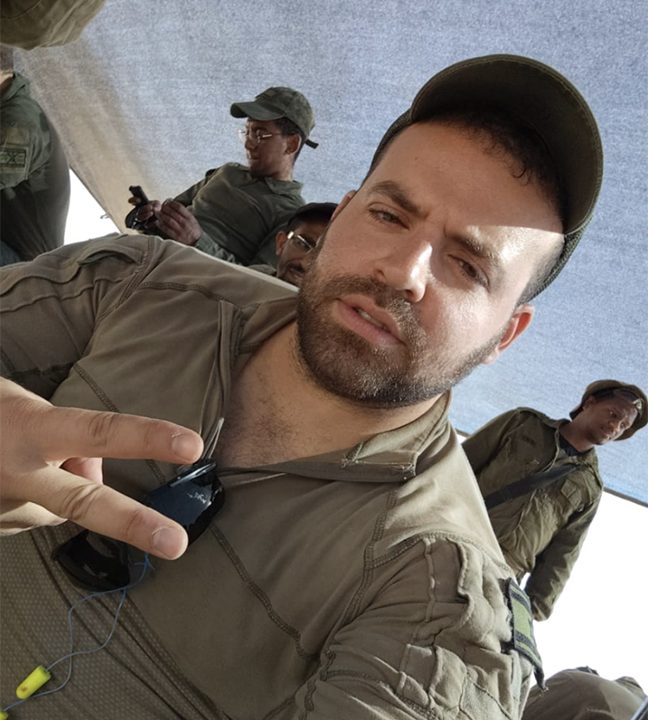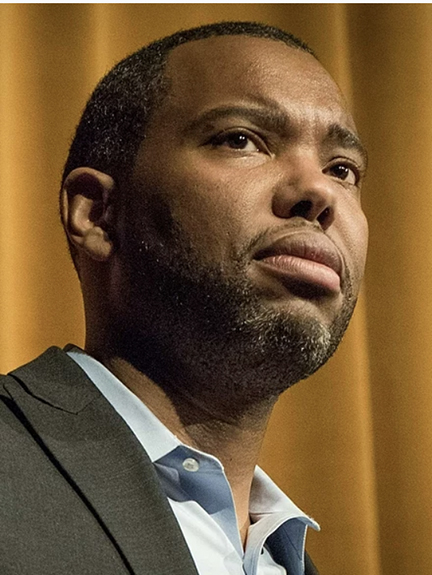Ta-Nehisi Coates joins the Black4Palestine deception

Author Ta-Nehisi Coates is seen onstage during the “Alight Align Arise: Advancing the Movement for Repair” national conference at Thompson Buckhead in Atlanta on June 7, 2023. Photo by Carol Lee Rose/Getty Images for Decolonizing Wealth Project.
by Dumisani Washington
(JNS) — With widely read books such as “Between the World and Me,” and “The Case for Reparations,” Ta-Nehisi Coates is a well-known author within the Black, social-justice space. In his latest work of nonfiction, “The Message,” Coates delves into the Arab-Israeli conflict and further reveals the same flawed, ill-informed thinking that has characterized the KGB-imported Black4Palestine movement since its inception in the 1960s.
From his website, “Finally, in the book’s longest section, Coates travels to Palestine, where he sees with devastating clarity how easily we are misled by nationalist narratives, and the tragedy that lies in the clash between the stories we tell and the reality of life on the ground.”
The most ironic part of this quote is that Coates is the one being “misled by (Arab) nationalist narratives” the way so many Black American thinkers before him like James Baldwin, Malcolm X and the anti-Zionist-turned-Zionist Eldridge Cleaver. These pro-Palestinian/anti-Israel historical figures within the Black American political and intellectual class stood in stark contrast to the Israel/peace-supporting Dr. Martin Luther King, Bayard Rustin and A. Philip Randolph. It is important to note that, in the same way that Baldwin, Malcolm, and (initially) Cleaver got the Palestinian issue so wrong in the 1960s, Black people like Coates, Marc Lamont Hill and Cornel West get it wrong today. While much can be said in analyzing the Black4Palestine delusion (I write about it in my book, “Zionism and the Black Church”), it can be briefly stated in two points:
- The Arab Palestinians’ true oppressors are their leaders (Hamas and the PLO), not Israel.
- Black solidarity with the Arabs of the Palestinian territories (and against Israel) necessarily ignores the millions of Black Africans slaughtered and enslaved by Arabs throughout the region today — for centuries.
Admittedly, I have not read Coates’ “The Message.” But based on his own and others’ descriptions, I can confidently state that there will be no genuine discussion of either of the two points listed above. Within the Black4Palestine campaign, there rarely is.
I offer these quotes from a recent New York Magazine article “The Return of Ta-Nehisi Coates” as evidence: “Our own age of strife takes Coates to three places: Dakar, Senegal, where he makes a pilgrimage to Gorée Island and the Door of No Return; Chapin, South Carolina… and the West Bank and East Jerusalem.”
“Coates is interested in patterns of domination, in how oppression replicates itself in different contexts, and in the ‘related traumas of colonialism and enslavement,’ as he writes in his essay on Dakar, a beautiful, searching examination of how his racial consciousness has evolved over time and across space. ‘I knew slavery and Jim Crow, and they knew conquest and colonialism,’ he writes of the Senegalese. The kinship he feels with the Palestinians has similar origins. ‘I felt the warmth of solidarity of ‘conquered peoples,’ as one of my comrades put it, finding each other across the chasm of oceans and experience,’ he writes.”
There are so many African slaves to Arab masters in Libya that one African Union representative called Libya “The new Gore’e Slave Market.” Coates did not travel to and comment on Libya.
“Oppression” and “enslavement” are what Nigerian Christians are experiencing as some 6,000 are slaughtered each year by Islamic terrorists such as Boko Haram or the Fulani Herdsman. As Nigerian Stephen Enada explained in Newsweek: “When African children and women are killed in their sleep, teenage girls sexually trafficked across the Mediterranean and young boys kidnapped for use as child soldiers, there is no global response. Terrorism is planned, funded and executed by terrorists and their global networks.”
Enada then asked, “Why are there no reports analyzing funders and planners of terrorist murder in Nigeria, of genocidal assaults in Africa?”
Coates did not travel to and comment on Nigeria.
After the Hamas massacre of some 1,200 Israelis on Oct. 7, former Sudanese slave Simon Deng wrote a piece for Tablet magazine, “First They Came for My People, Then They Came for the Jews.”
“What Hamas did was precisely like what Arab Sudan’s genocidal government did to my people,” Deng wrote. “Since they invaded Africa in the seventh century, Arab Muslims had always been doing jihad. We will never really know many Blacks have died between then and today. It is one of those numbers which, because it is unknown, proves how huge the suffering must be.”
Coates did not travel to and comment on Sudan. He did not “[feel] the warmth of solidarity of ‘conquered peoples’” under any Arab imperialist regime. He was not “interested in patterns of domination, [or] how oppression replicates itself in different contexts” when it came to the 1,400-year-long Arab enslavement of Africans.
Like the misled who have come before him, his sympathies have been manipulated toward what he perceives as anti-colonial, anti-Western or anti-White movements. This is how Yasser Arafat and the PLO repackaged the Nazi-inspired determination to destroy the Jewish State of Israel. Recast the Israeli Jews as white settler-colonizers and Western imperialists — never mind the fact that Zionism is the liberation movement of the Jewish people or the fact that over 50 percent of Israel’s Jewish population fled the Arabized/Islamized countries of North Africa and the Middle East.
Coates’s insistence that Israel is oppressing Arab Palestinians is a prescribed, Marxist binary of oppressed vs. oppressor. It ignores both the wealthy and exploitative Arab regimes in power (Hamas’s surviving leaders are worth $11 billion) and the true suffering in the region.
In his critique of Coates’ newfound Palestine cause, Unherd’s Ralph Leonard touches on an additional aspect of the Black4Palestine travesty.
“The irony is that before the ’70s, Black American writers, activists and intellectuals such as W.E.B. Du Bois, Bayard Rustin and Paul Robeson would have said the same thing [that Coates says about Palestine], but [said it] about the Zionist cause. Many Black nationalists, from Edward Wilmot Blyden to Marcus Garvey, made analogies between the Zionist project to ‘return’ the Jews to Zion and their own ‘back-to-Africa’ schemes.”
Africa-Israel Weekly published an academic article by professor Ansel Brown of North Carolina Central University (an HBCU) entitled “Zionism and Pan-Africanism: A Common Journey to Recapture Ethnic Self-Realization.” The Institute for Black Solidarity with Israel also produced a video based on Brown’s work. As the saying goes, there are so many receipts that refute the Black4Palestine hypocrisy, that one must be diligent to ignore them.
Dumisani Washington is the founder and CEO of the Institute for Black Solidarity with Israel.



